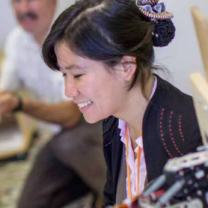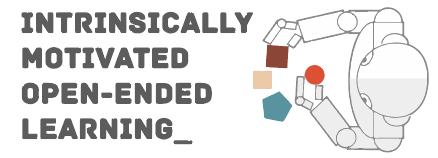 |
| Sao Mai Nguyen |
| organizer • speaker |
Bio
Sao Mai Nguyen specializes in cognitive developmental learning, reinforcement learning, imitation learning, automatic curriculum learning for robots : she develops algorithms for robots to learn multi-task controls by designing themselves their curriculum and by active imitation learning.
She received her PhD from Inria in 2013 in computer science, for her machine learning algorithms combining reinforcement learning and active imitation learning for interactive and multi-task learning. She holds an Engineer degree from Ecole Polytechnique, France and a master’s degree in adaptive machine systems from Osaka University, Japan. She has coordinated project KERAAL to enable a robot to coach physical rehabilitation. She has participated in project AMUSAAL, for analysing human activities of daily living, and CPER VITAAL for developing assistive technologies for the elderly and disabled. She is currently an assistant professor at Ensta IP Paris, France and was previously with IMT Atlantique. She also acts as an associate editor of the journal IEEE TCDS and the co-chair of the Task force “Action and Perception” of the IEEE Technical Committee on Cognitive and Developmental Systems.
Google scholar page • Personal webpage
Talk
As general actions by human action analysis can be modeled in a hierarchical manner, robots that can carry out more complex tasks than simple machines also need to learn to control their environment using a hierachical model. This learning process needs to be framed in the life-long learning framework, allowing learning agents to learn in a continual manner multiple tasks by devising their own curriculum in a open-ended manner with intrinsic motivation, by interaction with their environment and humans.
We present how human movements have been analysed in a hierarchical manner for a robot coach for physical rehabilitation in project Keraal (http://keraal.enstb.org), and how activities of daily living, in smart homes equipped with IoT, can be modeled with its context and in a hierarchical way using NLP methods for sequence modelling. We also present how robotic arms learn hierarchies between complex tasks to allow automatic curriculum learning and transfer of knowledge from simple tasks to more complex task. We present two models : a sequential and a nested model for robot control. The learning of both models relies on the simple theory of developmental theory : intrinsic motivation, which allows learning without a specified goal but in an open-ended process. Intrinsic motivation also allows the robot to automatically devise its learning curriculum to learn simple to complex tasks.
